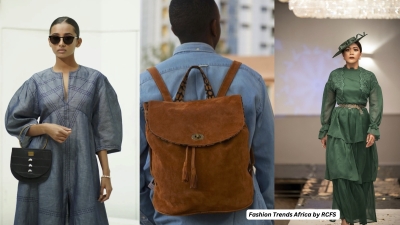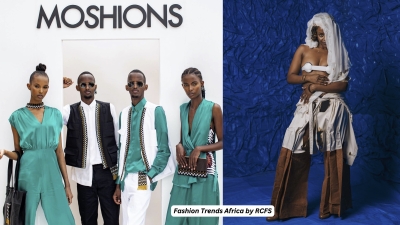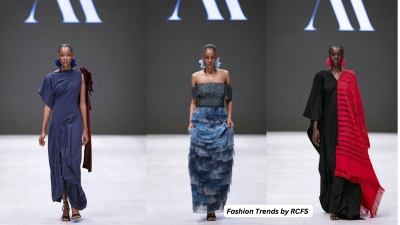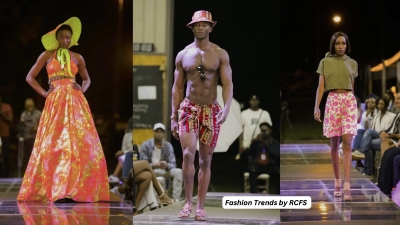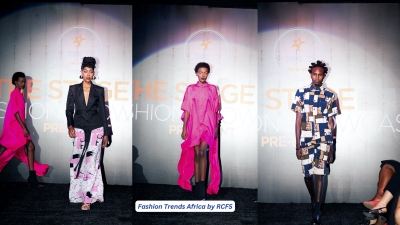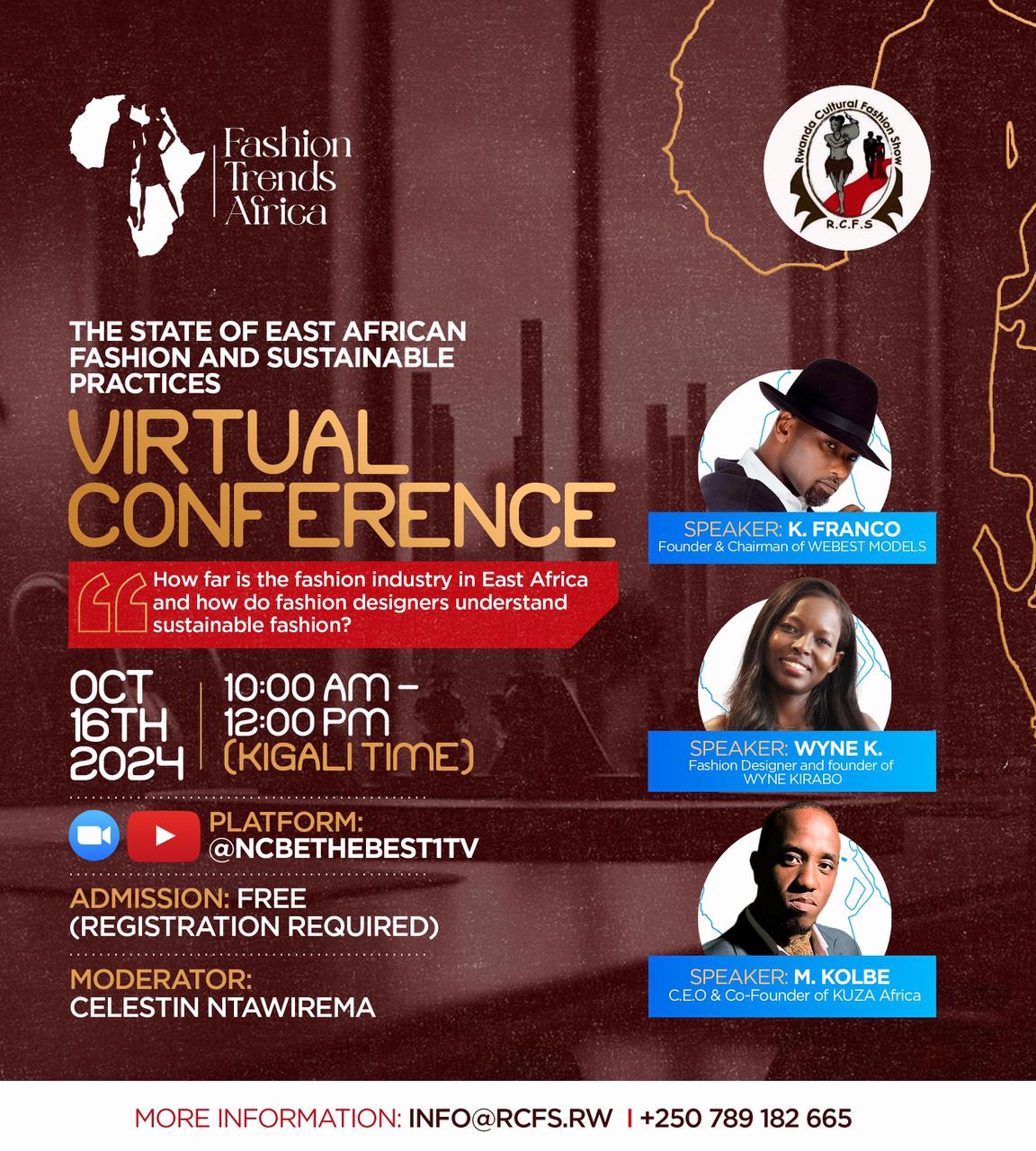 Model wearing outfit made from recycled materials on the Runway during the Africa Fashion Week London (Photo AFWL)
Model wearing outfit made from recycled materials on the Runway during the Africa Fashion Week London (Photo AFWL)
When will African Fashion Designers adapt to Sustainable Fashion?
Sustainable fashion in Africa is gaining momentum as the continent becomes more conscious of environmental and social issues related to the fashion industry. In many countries, sustainable fashion is becoming increasingly important in the fashion industry, and many designers are now incorporating sustainable practices into their collectin
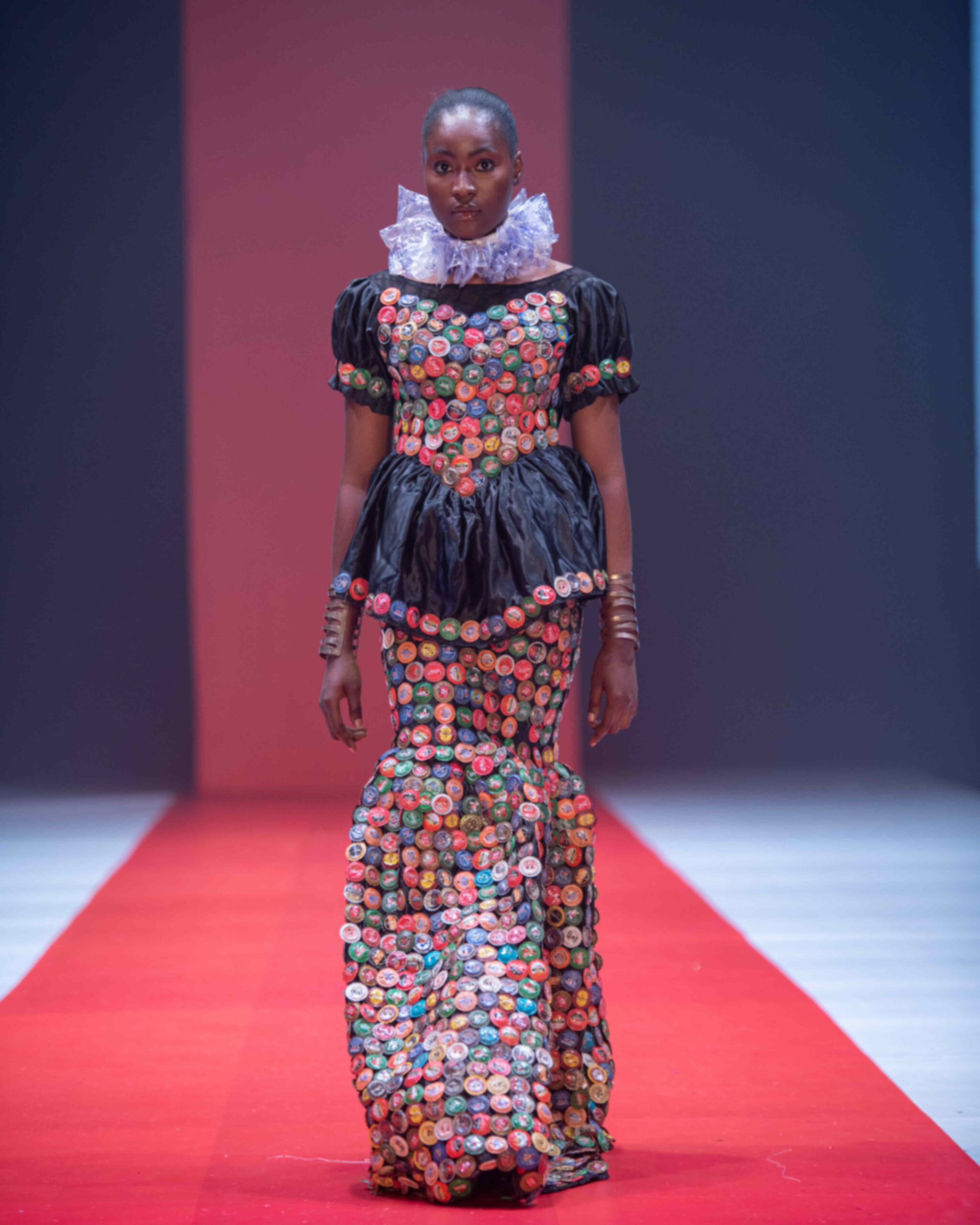 Model wearing outfit made from recycled materials on the Runway during the Africa Fashion Week London (Photo AFWL)
Model wearing outfit made from recycled materials on the Runway during the Africa Fashion Week London (Photo AFWL)
"It is possible to reach a sustainable fashion industry in Africa, but several steps need to be taken at various levels, including government, industry, consumers, and communities. Instead of relying on imported materials, many African fashion brands should also source materials locally, to support local economies and reduce carbon emissions associated with transportation." Fashion expert said
 Model wearing outfit made from recycled materials on the Runway during the Africa Fashion Week London (Photo AFWL)
Model wearing outfit made from recycled materials on the Runway during the Africa Fashion Week London (Photo AFWL)
Podcast/Made In Africa Show:All African Women You are Beautiful - We Must Embrace Our Culture I Ms Lorraine LOSHAQ KLAJIC
According to fashion experts, Africa is vulnerable when it comes to climate change impacts and fashion designers can also contribute to reducing some of the waste turning it into something usable.
"Africa is vulnerable to climate change impacts and there are many things fashion designers can do to reduce the waste including Upcycling and Recycling. For example, using old tires to produce shoes and using water bottles to make toys and many other wastes. It is a matter of creativity and being able to get machines to use" Fashion Expert added
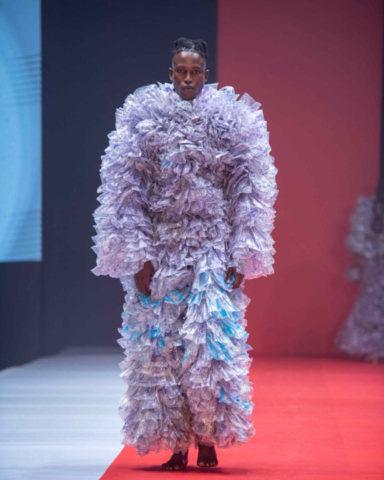 Model wearing outfit made from recycled materials on the Runway during the Africa Fashion Week London (Photo AFWL)
Model wearing outfit made from recycled materials on the Runway during the Africa Fashion Week London (Photo AFWL)
 Model wearing outfit made from recycled materials on the Runway during the Africa Fashion Week London (Photo AFWL)
Model wearing outfit made from recycled materials on the Runway during the Africa Fashion Week London (Photo AFWL)
There are some initiatives such as ethical production where many African fashion brands are focusing on ethical production practices, ensuring fair wages and safe working conditions for workers. This includes using locally sourced materials and supporting artisanal communities. Furthermore, the use of traditional techniques where African fashion designers often incorporate traditional craftsmanship and techniques into their designs, preserving cultural heritage while promoting sustainable practices.
 Model wearing outfit made from recycled materials on the Runway during the Africa Fashion Week London (Photo AFWL)
Model wearing outfit made from recycled materials on the Runway during the Africa Fashion Week London (Photo AFWL)
" Community empowerment is also very important to reach Sustainable fashion. We need to come up with initiatives in Africa that prioritize our community empowerment by providing training and employment opportunities to local artisans and craftsmen" said Aline Rugira.
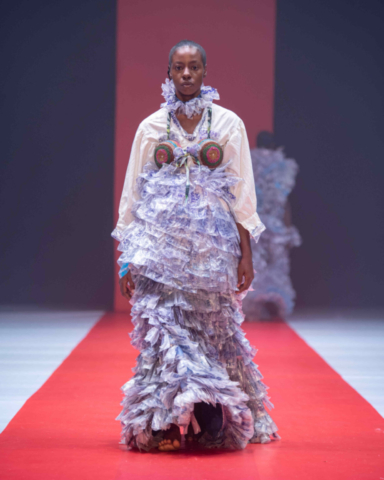 Model wearing outfit made from recycled materials on the Runway during the Africa Fashion Week London (Photo AFWL)
Model wearing outfit made from recycled materials on the Runway during the Africa Fashion Week London (Photo AFWL)
 Model wearing outfit made from recycled materials on the Runway during the Africa Fashion Week London (Photo AFWL)
Model wearing outfit made from recycled materials on the Runway during the Africa Fashion Week London (Photo AFWL)
Podcast/Made In Africa Show: What Takes to Become a Professional Model in Africa I Model Coach Ms. Ingred AWUOR
According to fashion experts to reach sustainable fashion several steps can be taken at various levels:
- Policy Support: Governments can implement policies and regulations that promote sustainable practices within the fashion industry. This could include incentives for sustainable production, waste management regulations, and support for ethical labor practices.
 Model wearing outfit made from recycled materials on the Runway during the Africa Fashion Week London (Photo AFWL)
Model wearing outfit made from recycled materials on the Runway during the Africa Fashion Week London (Photo AFWL)
- Investment in Infrastructure: Infrastructure for sustainable fashion, such as recycling facilities and eco-friendly production facilities, needs investment. Governments and private investors can support the development of such infrastructure.
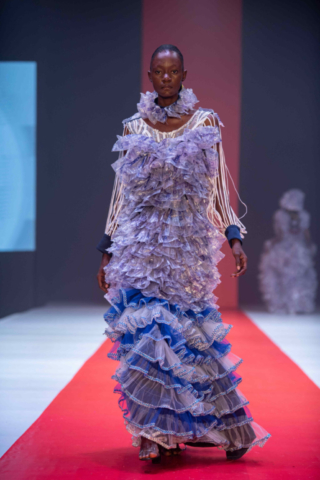 Model wearing outfit made from recycled materials on the Runway during the Africa Fashion Week London (Photo AFWL)
Model wearing outfit made from recycled materials on the Runway during the Africa Fashion Week London (Photo AFWL)
- Education and Training: Providing education and training programs for designers, manufacturers, and consumers on sustainable fashion practices can increase awareness and adoption of eco-friendly methods.
 Model wearing outfit made from recycled materials on the Runway during the Africa Fashion Week London (Photo AFWL)
Model wearing outfit made from recycled materials on the Runway during the Africa Fashion Week London (Photo AFWL)
Podcast/Made In Africa Show: From Modeling to Fashion Show Producer by Ingred AWUOR
- Support for Local Artisans: Governments and organizations can support local artisans and craftspeople by providing training, resources, and access to markets. This not only preserves traditional craftsmanship but also promotes sustainable, locally-made products.
 Model wearing outfit made from recycled materials on the Runway during the Africa Fashion Week London (Photo AFWL)
Model wearing outfit made from recycled materials on the Runway during the Africa Fashion Week London (Photo AFWL)
- Research and Innovation: Investing in research and development of sustainable materials, production techniques, and technologies can drive innovation in the African fashion industry.
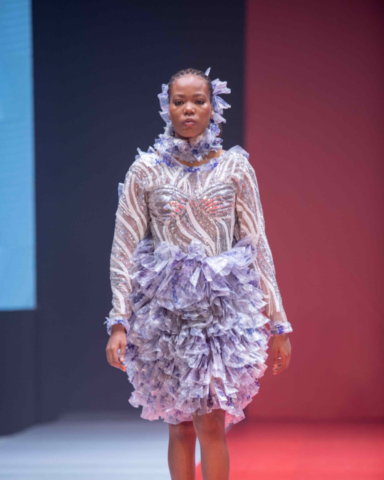 Model wearing outfit made from recycled materials on the Runway during the Africa Fashion Week London (Photo AFWL)
Model wearing outfit made from recycled materials on the Runway during the Africa Fashion Week London (Photo AFWL)
- Collaboration and Networking: Encouraging collaboration between stakeholders such as designers, manufacturers, NGOs, and government agencies can foster a more cohesive and effective approach to sustainable fashion.
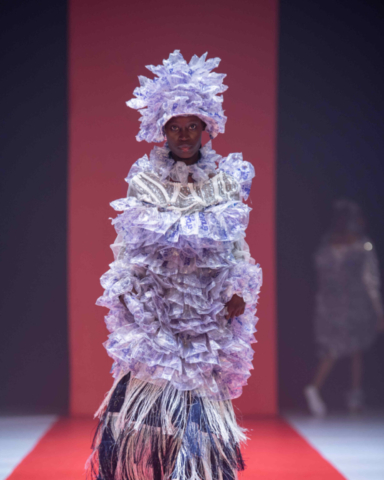 Model wearing outfit made from recycled materials on the Runway during the Africa Fashion Week London (Photo AFWL)
Model wearing outfit made from recycled materials on the Runway during the Africa Fashion Week London (Photo AFWL)
- Consumer Awareness: Educating consumers about the environmental and social impacts of their fashion choices can drive demand for sustainable products and encourage brands to adopt more eco-friendly practices
 Model wearing outfit made from recycled materials on the Runway during the Africa Fashion Week London (Photo AFWL)
Model wearing outfit made from recycled materials on the Runway during the Africa Fashion Week London (Photo AFWL)
Podcast/Made In Africa Show:African Woman Loves Comfort and Loves Free-flowing Clothes I Ms. Ingred AWUOR
- Certification and Labeling: Developing certification schemes and labeling initiatives for sustainable fashion products can help consumers make informed choices and incentivize brands to adopt sustainable practices.
 Model wearing outfit made from recycled materials on the Runway during the Africa Fashion Week London (Photo AFWL)
Model wearing outfit made from recycled materials on the Runway during the Africa Fashion Week London (Photo AFWL)
- Circular Economy Initiatives: Promoting a circular economy approach to fashion, where products are designed for durability, repairability, and recyclability, can help minimize waste and environmental impact.
 Model wearing outfit made from recycled materials on the Runway during the Africa Fashion Week London (Photo AFWL)
Model wearing outfit made from recycled materials on the Runway during the Africa Fashion Week London (Photo AFWL)
- Partnerships with International Organizations: Collaborating with international organizations and initiatives focused on sustainable fashion can provide access to resources, expertise, and markets, helping African brands to scale up their sustainability efforts.
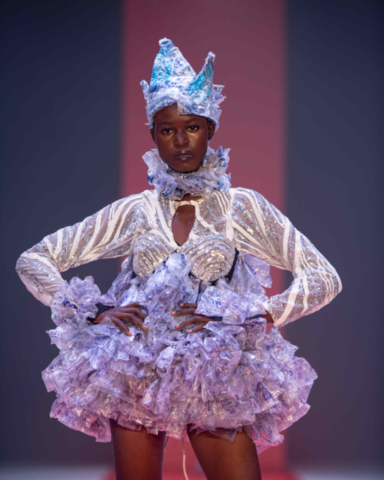 Model wearing outfit made from recycled materials on the Runway during the Africa Fashion Week London (Photo AFWL)
Model wearing outfit made from recycled materials on the Runway during the Africa Fashion Week London (Photo AFWL)
Latest from RCFS
- One week to go until Africa Sourcing and Fashion Week 2024: Designers, Exhibitors, and Speakers
- One week to go until Africa Sourcing and Fashion Week 2024: Designers, Exhibitors, and Speakers
- 9 Years Milestone: Moses Turahirwa and His Moshions Brand Rwanda-Based
- 9 Years Milestone: Moses Turahirwa and His Moshions Brand Rwanda-Based
- What to Expect in Lagos Heineken Fashion Week 2024: Runways Kick off Today



